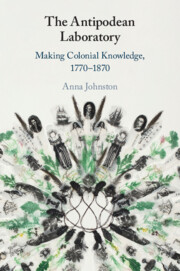Book contents
- The Antipodean Laboratory
- The Antipodean Laboratory
- Copyright page
- Dedication
- Contents
- Figures
- Acknowledgements
- Note on the Text
- Introduction
- Part I Imagining Settler Humanitarianism
- 1 Morality, Violence and Sentiment
- 2 Language, Poetry and Song
- Part II Regulating Settler Society
- Part III Inventing Settler Science
- Bibliography
- Index
2 - Language, Poetry and Song
Reading Indigenous Wordlists and Grammars, 1770–1874
from Part I - Imagining Settler Humanitarianism
Published online by Cambridge University Press: 21 September 2023
- The Antipodean Laboratory
- The Antipodean Laboratory
- Copyright page
- Dedication
- Contents
- Figures
- Acknowledgements
- Note on the Text
- Introduction
- Part I Imagining Settler Humanitarianism
- 1 Morality, Violence and Sentiment
- 2 Language, Poetry and Song
- Part II Regulating Settler Society
- Part III Inventing Settler Science
- Bibliography
- Index
Summary
This chapter examines linguistic studies to explore colonial knowledge production as a shared, cross-cultural process between Indigenous people and European interlocutors. Colonial officials learnt languages from trusted individuals, such as the surveyor and astronomer William Dawes and the Indigenous woman Patyegarang in the 1790s. Nineteenth-century linguistic collection was undertaken by amateur settlers with a variety of intentions. Collected on the frontier, and often in the midst of massacre and violent dispossession, wordlists, songs and grammars contain evidence of traditional Indigenous knowledge as it was translated and transcribed into new forms. The Revd Lancelot Threlkeld’s Awabakal language collaborations with Biraban from the 1820s were circulated to imperial exhibitions and Sir George Grey’s library in Cape Town. Indigenous languages enabled Eliza Hamilton Dunlop to write poetry on Indigenous themes in New South Wales in the 1840s that publicised settler violence and massacres. Harriott Barlow’s language records of southwest Queensland were published by the Royal Anthropological Institute of Great Britain in 1873. Distributed, published and consumed far from their frontier sites of collection, linguistic studies from the Australian colonies were influential in major world theories of language, race and culture.
Keywords
- Type
- Chapter
- Information
- The Antipodean LaboratoryMaking Colonial Knowledge, 1770–1870, pp. 66 - 112Publisher: Cambridge University PressPrint publication year: 2023

